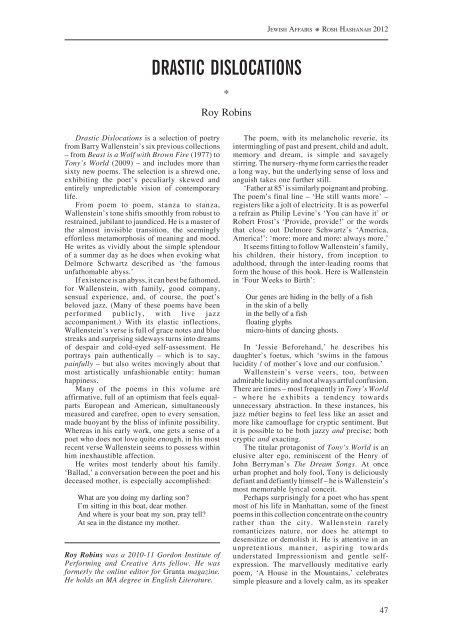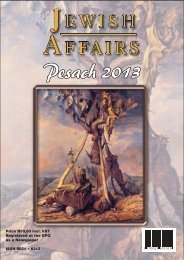Jewish Affairs - South African Jewish Board of Deputies
Jewish Affairs - South African Jewish Board of Deputies
Jewish Affairs - South African Jewish Board of Deputies
- No tags were found...
Create successful ePaper yourself
Turn your PDF publications into a flip-book with our unique Google optimized e-Paper software.
JEWISH AFFAIRS ROSH HASHANAH 2012DRASTIC DISLOCATIONS*Roy RobinsDrastic Dislocations is a selection <strong>of</strong> poetryfrom Barry Wallenstein’s six previous collections– from Beast is a Wolf with Brown Fire (1977) toTony’s World (2009) – and includes more thansixty new poems. The selection is a shrewd one,exhibiting the poet’s peculiarly skewed andentirely unpredictable vision <strong>of</strong> contemporarylife.From poem to poem, stanza to stanza,Wallenstein’s tone shifts smoothly from robust torestrained, jubilant to jaundiced. He is a master <strong>of</strong>the almost invisible transition, the seeminglyeffortless metamorphosis <strong>of</strong> meaning and mood.He writes as vividly about the simple splendour<strong>of</strong> a summer day as he does when evoking whatDelmore Schwartz described as ‘the famousunfathomable abyss.’If existence is an abyss, it can best be fathomed,for Wallenstein, with family, good company,sensual experience, and, <strong>of</strong> course, the poet’sbeloved jazz. (Many <strong>of</strong> these poems have beenperformed publicly, with live jazzaccompaniment.) With its elastic inflections,Wallenstein’s verse is full <strong>of</strong> grace notes and bluestreaks and surprising sideways turns into dreams<strong>of</strong> despair and cold-eyed self-assessment. Heportrays pain authentically – which is to say,painfully – but also writes movingly about thatmost artistically unfashionable entity: humanhappiness.Many <strong>of</strong> the poems in this volume areaffirmative, full <strong>of</strong> an optimism that feels equalpartsEuropean and American, simultaneouslymeasured and carefree, open to every sensation,made buoyant by the bliss <strong>of</strong> infinite possibility.Whereas in his early work, one gets a sense <strong>of</strong> apoet who does not love quite enough, in his mostrecent verse Wallenstein seems to possess withinhim inexhaustible affection.He writes most tenderly about his family.‘Ballad,’ a conversation between the poet and hisdeceased mother, is especially accomplished:What are you doing my darling son?I’m sitting in this boat, dear mother.And where is your boat my son, pray tell?At sea in the distance my mother.Roy Robins was a 2010-11 Gordon Institute <strong>of</strong>Performing and Creative Arts fellow. He wasformerly the online editor for Granta magazine.He holds an MA degree in English Literature.The poem, with its melancholic reverie, itsintermingling <strong>of</strong> past and present, child and adult,memory and dream, is simple and savagelystirring. The nursery-rhyme form carries the readera long way, but the underlying sense <strong>of</strong> loss andanguish takes one further still.‘Father at 85’ is similarly poignant and probing.The poem’s final line – ‘He still wants more’ –registers like a jolt <strong>of</strong> electricity. It is as powerfula refrain as Philip Levine’s ‘You can have it’ orRobert Frost’s ‘Provide, provide!’ or the wordsthat close out Delmore Schwartz’s ‘America,America!’: ‘more: more and more: always more.’It seems fitting to follow Wallenstein’s family,his children, their history, from inception toadulthood, through the inter-leading rooms thatform the house <strong>of</strong> this book. Here is Wallensteinin ‘Four Weeks to Birth’:Our genes are hiding in the belly <strong>of</strong> a fishin the skin <strong>of</strong> a bellyin the belly <strong>of</strong> a fishfloating glyphsmicro-hints <strong>of</strong> dancing ghosts.In ‘Jessie Beforehand,’ he describes hisdaughter’s foetus, which ‘swims in the famouslucidity / <strong>of</strong> mother’s love and our confusion.’Wallenstein’s verse veers, too, betweenadmirable lucidity and not always artful confusion.There are times – most frequently in Tony’s World– where he exhibits a tendency towardsunnecessary abstraction. In these instances, hisjazz métier begins to feel less like an asset andmore like camouflage for cryptic sentiment. Butit is possible to be both jazzy and precise; bothcryptic and exacting.The titular protagonist <strong>of</strong> Tony’s World is anelusive alter ego, reminiscent <strong>of</strong> the Henry <strong>of</strong>John Berryman’s The Dream Songs. At onceurban prophet and holy fool, Tony is deliciouslydefiant and defiantly himself – he is Wallenstein’smost memorable lyrical conceit.Perhaps surprisingly for a poet who has spentmost <strong>of</strong> his life in Manhattan, some <strong>of</strong> the finestpoems in this collection concentrate on the countryrather than the city. Wallenstein rarelyromanticizes nature, nor does he attempt todesensitize or demolish it. He is attentive in anunpretentious manner, aspiring towardsunderstated Impressionism and gentle selfexpression.The marvellously meditative earlypoem, ‘A House in the Mountains,’ celebratessimple pleasure and a lovely calm, as its speaker47











